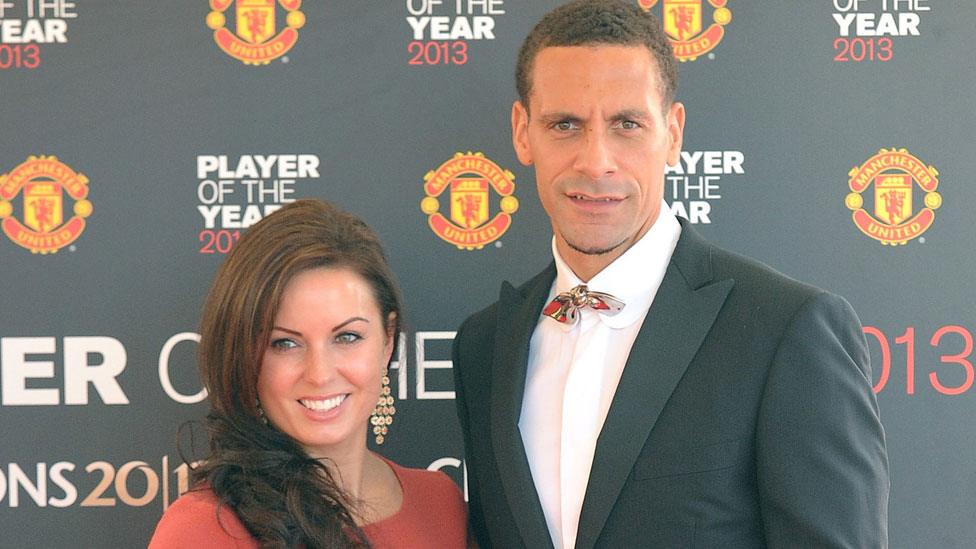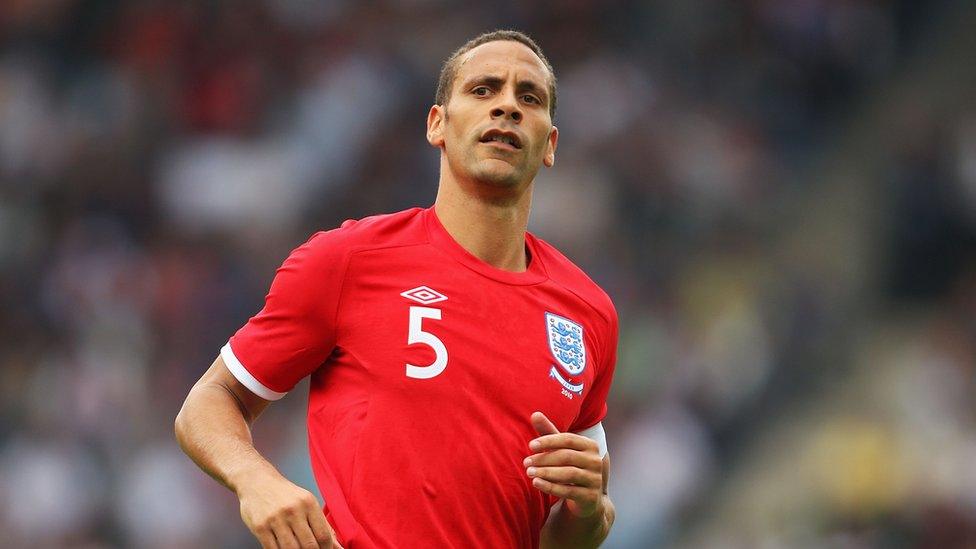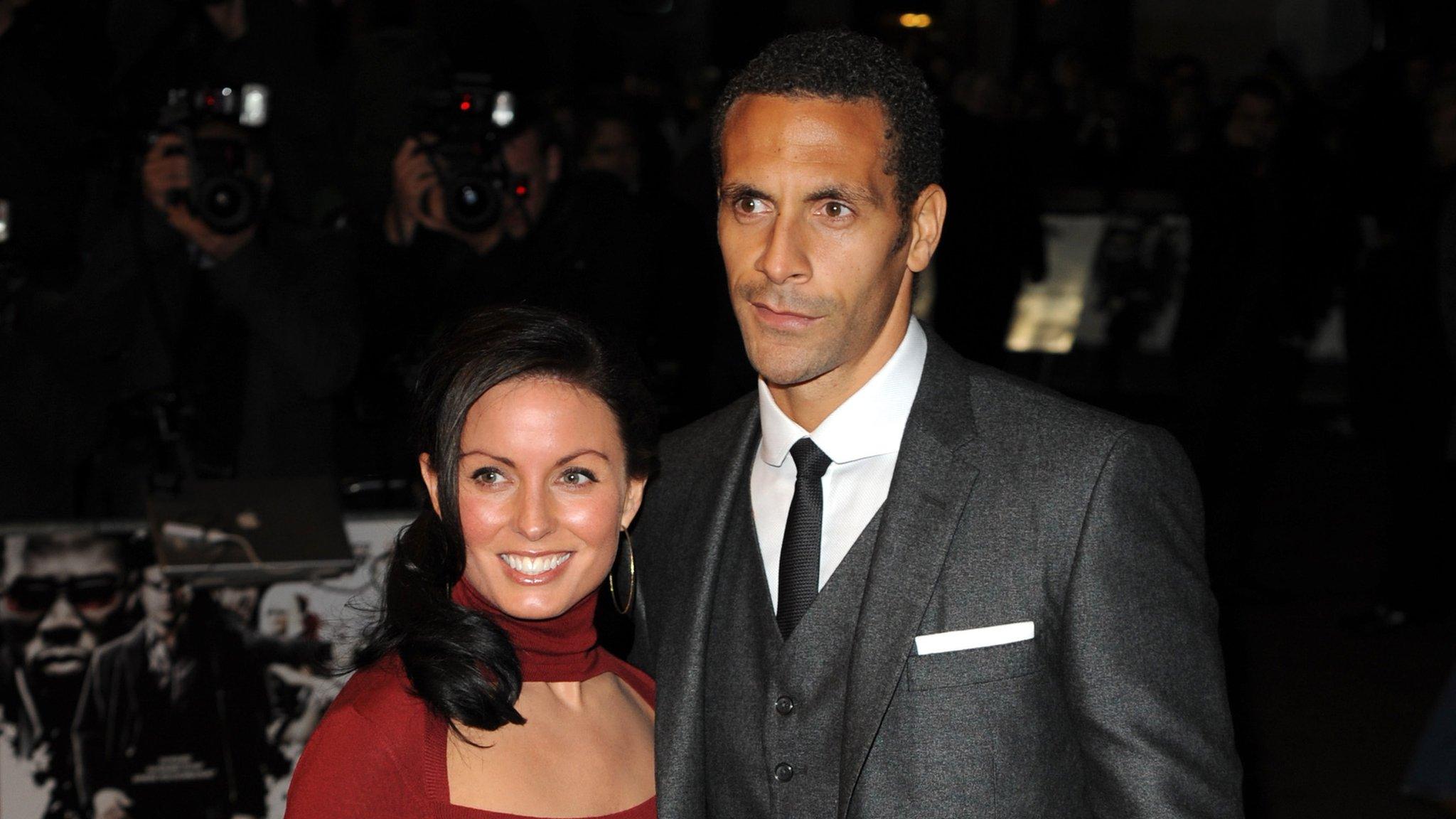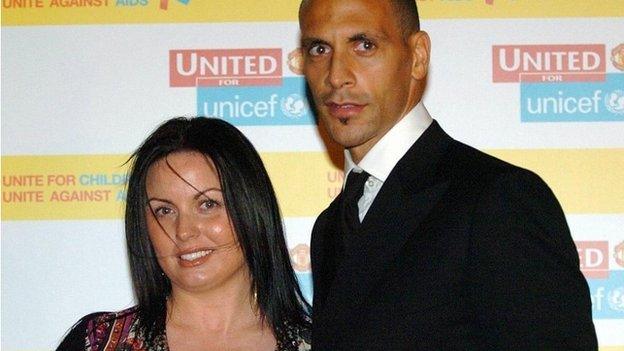Rio Ferdinand: My kids would not talk about grief
- Published
Rio Ferdinand opens up about his wife's death
Former England captain Rio Ferdinand has told the BBC that his children would not talk about the death of their mother.
Speaking to BBC Radio 5 live, he said his children would "shut me down" when he asked them how they were feeling.
He said he did not know the best way to talk to his three children, now aged 10, eight and five.
Ferdinand's wife, Rebecca, was 34 when she died of breast cancer in May 2015. The couple got married in 2009.
The ex-Manchester Utd defender was speaking to 5 live ahead of a BBC One documentary about grief on Tuesday at 21:00 BST.
Memory jar
He told 5 live's Emma Barnett: "I didn't know any techniques to speak to the children. I didn't know what buttons to push.
"I'd been starting conversations with them to try and get how they were feeling out, and they would just shut me down, walk away, close the conversation down completely."
In the BBC One programme, Ferdinand starts a memory jar for the family, enabling the children to talk about the happy moments when their mum was alive.
He said: "It kind of opened everything up and it was a beautiful moment just seeing them talk happily and being joyful about their mum rather than it being sad and negative moments.
"It switched it from dark to bright."
'A work-in-progress'
Ferdinand also said that, in the wake of Rebecca's death, he now understands why people contemplate suicide.
He told 5 live: "When you come into this situation you understand suicide, you understand people who do that and have those thoughts.
"I didn't think about it myself but I understand now how people get to that situation.
"I can't judge people like that now, whereas before I'd be sitting there, probably with Rebecca, saying that guy is so ignorant and selfish how has he just done that - left three beautiful kids.
"Now I could say I understand how he got to that point. I wouldn't do it, but I understand how he's there. You do get to those levels - and so it's a work-in-progress.

Rio Ferdinand and Rebecca Ellison got married in 2009
Ferdinand said: "At the beginning I'd sit and think how am I ever going to be happy?
"I can't see a point where I'm ever going to be able to smile, because I can get happy over here, but then I look at my children - and that brings you right back into sadness again because they haven't got a mum."
Throughout Tuesday's programme, he meets other widowers and talks to them about rebuilding a life and moving on.
But he would not be drawn on his own relationships, saying he was "disappointed" that there had been speculation about his private life, after recent photos in a tabloid newspaper linked him with a reality TV star.
'No right time'
He told 5 live: "That's disappointing... protecting my children is always the biggest thing for me... and that's what I'm fearful of with things being in the press.
"But the documentary has taught me there isn't a right time for anything like that, for if you're going to move on in a relationship... there is no right time.
"The only person who knows the right time is the person in those shoes. I've never spoken about my relationships in the past, in the public eye, and I'm not going to start talking about relationships or potential relationships that people are reporting on."
Commenting on how long it takes to recover from bereavement, Ferdinand said the government was "wrong" to cut back on the length of time widowed parents can receive a benefit.

Ferdinand retired from football at the age of 36 in May 2015, the same month his wife died
Changes mean that from 6 April 2017, bereaved parents will only receive payments for 18 months. Previously, the payment lasted until children were 16 years old.
He said: "If I'm honest, I don't understand how the government can actually say there's a timescale on it because there is no timescale on anything to do with bereavement - every individual is different.
"One person may take six months another person may take 10 years. There isn't a time when you can say, 'Yeah I'm over it'. Putting a number on it is the wrong thing to do."
A spokesman for the Department for Work and Pensions said the Bereavement Support Scheme was designed to help protect families from sudden financial difficulties.
He said: "We are updating an old system that was based on the outdated assumption that a widowed parent relied on their spouse for income, and would never work themselves. This does not reflect people's lives today.
He added: "Once the payments come to an end, there are means-tested benefits which can continue to support the bereaved, especially those who are bringing up children.
"The new payment is easier to claim, won't be taxed and does not affect the amount received from other benefits, helping those on the lowest incomes the most."
- Published7 February 2017

- Published24 May 2015

- Published2 May 2015
